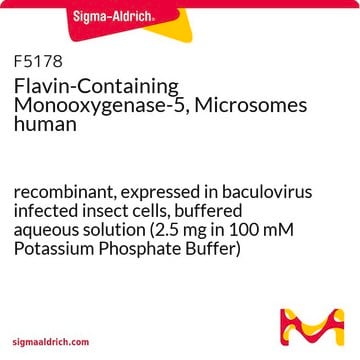F5053
Flavin-Containing Monooxygenase-3, Microsomes human
recombinant, expressed in baculovirus infected insect cells, buffered aqueous solution
Synonym(s):
FMO-3
Sign Into View Organizational & Contract Pricing
All Photos(1)
About This Item
Recommended Products
recombinant
expressed in baculovirus infected insect cells
Quality Level
form
buffered aqueous solution
mol wt
55-60 kDa
packaging
vial of 2.5 mg
UniProt accession no.
shipped in
dry ice
storage temp.
−70°C
Gene Information
human ... FMO3(2328)
General description
Flavin-Containing Monooxygenase-3 (FMO3) is a member of the flavin-containing monooxygenase (FMO) family of enzymes. It is highly expressed in the human liver.
Application
FMO3 is the major human hepatic form.
Biochem/physiol Actions
Flavin-Containing Monooxygenase-3 (FMO3) facilitates the oxidization of several drugs, chemicals, and xenobiotics. Human FMO3 is also involved in the synthesis of N-oxide of trimethylamine (TMAO) from trimethylamine (TMA). Mutations in the FMO3 gene are associated with trimethylaminuria or fish odor syndrome. Deficiency of the FMO3 gene results in lower plasma TMAO levels, which may reduce the risk of developing atherosclerosis and thrombosis.
Physical form
Solution in 100 mM potassium phosphate buffer, pH 7.4
Storage Class Code
10 - Combustible liquids
WGK
WGK 2
Flash Point(F)
Not applicable
Flash Point(C)
Not applicable
Personal Protective Equipment
dust mask type N95 (US), Eyeshields, Gloves
Certificates of Analysis (COA)
Search for Certificates of Analysis (COA) by entering the products Lot/Batch Number. Lot and Batch Numbers can be found on a product’s label following the words ‘Lot’ or ‘Batch’.
Already Own This Product?
Find documentation for the products that you have recently purchased in the Document Library.
Chongliang Gao et al.
Scientific reports, 7(1), 14668-14668 (2017-11-09)
Human flavin-containing monooxygenase 3 (hFMO3) catalyses the oxygenation of a wide variety of compounds including drugs as well as dietary compounds. It is the major hepatic enzyme involved in the production of the N-oxide of trimethylamine (TMAO) and clinical studies
W Zhu et al.
Journal of thrombosis and haemostasis : JTH, 16(9), 1857-1872 (2018-07-08)
Essentials Microbe-dependent production of trimethylamine N-oxide (TMAO) contributes to thrombosis risk. The impact of host flavin monooxygenase 3 (FMO3) modulation on platelet function is unknown. Genetic manipulation of FMO3 in mice alters systemic TMAO levels and thrombosis potential. Genetic manipulation
Irfan M Hisamuddin et al.
Pharmacogenomics, 8(6), 635-643 (2007-06-15)
Flavin-containing monooxygenase 3 (FMO3) is a hepatic microsomal enzyme that oxidizes a host of drugs, xenobiotics and other chemicals. Numerous variants in the gene encoding FMO3 have been identified, some of which result in altered enzymatic activity and, consequently, altered
Robert R Reddy et al.
Drug metabolism and disposition: the biological fate of chemicals, 38(12), 2239-2245 (2010-09-03)
The flavin-containing monooxygenase (FMO) family of enzymes oxygenates nucleophilic xenobiotics and endogenous substances. Human FMO3 and FMO5 are the predominant FMO forms in adult liver. These enzymes are naturally membrane-bound, and recombinant proteins are commercially available as microsomal preparations from
Our team of scientists has experience in all areas of research including Life Science, Material Science, Chemical Synthesis, Chromatography, Analytical and many others.
Contact Technical Service








